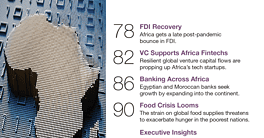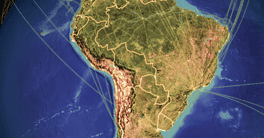Africa’s tech start-ups are enjoying greater access to funding, thanks to tech hubs, incubators and venture capital.

Tech start-ups in Africa have long struggled for funding, and face an uphill battle convincing larger companies to embrace their innovations. Now, thanks to a growing ecosystem of tech hubs, venture financing and other funding models, budding ventures on the continent are beginning to gain traction. Disrupt Africa’s third African Tech Startups Funding Report found a total of $195 million raised by startups in 2017, up 51% from the prior year, and called it “the most successful year of fundraising by African tech start-ups since tracking began.” Fintech received the most dollars, while e-commerce had the best year-on-year growth.
Tech hubs and incubators have been pillars of funding and support for Africa’s tech entrepreneurs, with Zimbabwe, Nigeria, Tanzania, South Africa and Kenya among the countries boasting rising numbers of initiatives. More than 440 hubs are now active on the continent, according to the GSMA Association, including 26 in Cape Town, 25 in Nairobi and 23 in Cairo. In other countries, such as Malawi, development-finance providers—including UNICEF—are partnering with tech hubs to develop solutions such as using drones to deliver food aid.
Stephen Buliani, founder of Innovation Hub Malawi, says that while inventors in that country have the potential to offer solutions to its economic and social challenges, they are starved of the money to do so. “There is no such thing as funding from the government or from telecom companies,” he says. “We have very passionate young innovators, but they are short of funding. At the Innovation Hub Malawi, we provide an environment where they can develop their innovations and get support.”
There are exceptions. In Zimbabwe, the government and telecom companies have established a tech-innovation fund: Telecoms contribute capital that is then spread to tech entrepreneurs, with additional support from the government through the Posts and Telecommunications Regulatory Authority.
Meanwhile, financiers such as Ecobank have been key in providing funding for disruptors, while business leaders have also furnished venture financing. The nonprofit foundation run by Nigerian banker and entrepreneur Tony Elumelu, for example, is on a 10-year mission to provide funds and training to 10,000 African entrepreneurs, and earlier this year gained support in this effort from a German development organization.
A Tough Bet
Kizito Okechukwu, co-chair of Global Entrepreneurship Network Africa, sees lack of access to funding and markets as the single greatest adversity faced by start-ups in Africa. Seed Academy’s State of Entrepreneurship in South Africa survey, released in September, found that the continent’s most advanced economy still remains challenging for innovators. Key deterrents include difficulties raising funds and attracting customers, and an unpredictable economic environment. The same challenges are present in all markets on the continent, say other start-up funding specialists.
Donna Rachelson, CEO of Seed Academy, notes only “small progress in terms of business survival rates, revenue increases, and more women entrepreneurs” in South Africa. “We still don’t have the basics right: early-stage funding and high-impact business support throughout the entrepreneurial journey.”
There are signs of progress, however. West Africa, Central Africa and Southern African markets have been noteworthy in terms of start-up funding and success stories, while Egypt and Tunisia have also shown improvement. This year, Norway-based Katapult Accelerator picked Egypt’s PraxiLabs, a low-immersion virtual-reality science lab, and Tunisia’s Think.iT, a start-up focused on helping companies assemble high-performing software development and engineering teams, as promising ventures for its support program.
Data from Disrupt Africa shows African tech start-ups raised as much as $195 million in funding in 2017, with South Africa, Nigeria and Kenya the major destinations. Another report, by WeeTracker, shows as much as $168 million flowing into early-stage African tech ventures in the first half of 2018, reflecting rising interest.
Nigeria has emerged as a strong funding base. “Larger capital-raising rounds by a growing number of tech companies signal a ‘coming of age’ of the Nigerian start-up ecosystem,” says VC4A, an online community of Africa-centric venture capitalists, angels and entrepreneurs, noting “increasing confidence” in this sector. As a result, according to the blog, there are a growing number of seed funds providing capital to Nigerian start-ups, including the Growth Capital Fund, Lagos Angel Network and MicroTraction.
Obtaining financing for budding ventures still isn’t easy, but the outlook has shown marked improvement, especially this year. Innovators across the continent are optimistic that their funding prospects will continue to brighten.



